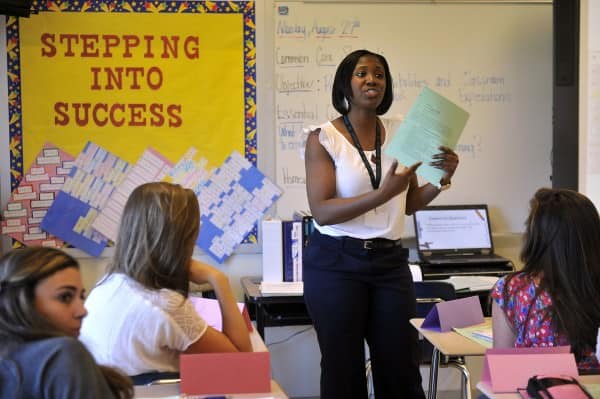The discussion about how to address racial and economic isolation in Charlotte-Mecklenburg Schools continues to sharpen, as advocacy groups and school board candidates begin to define their positions.
The latest discussion, at the Tuesday Morning Breakfast Forum in West Charlotte, underscores the notion that CMS’ student assignment review will be a difficult conversation and that opinions will not break cleanly by race, geography, or political affiliation.
About 50 people heard a presentation from Ken Simmons, a former CMS principal, and others who reject the suggestion that schools cannot succeed if they’re comprised significantly of one race. Simmons said campuses that are mostly black can be highly successful “if you have the right ingredients.”
Simmons and his supporters have an eight-point plan that they want CMS to implement in schools where more than half the student body is African-American. The proposal includes hiring more black educators and administrators, a more effective approach to discipline, better parent engagement strategies, and a focus on the African-American experience in the curriculum.
They reject the idea that CMS must make student assignment changes in order to address schools that are imbalanced based on race or poverty level. “There’s nothing special about, ‘Put me next to this white student and I’m going to score higher on the test,'” Simmons said. (You can watch his whole talk here.)
The Charlotte Observer reports that Simmons’ proposal was met with plenty of questions from the audience at the Forum, which is an important stop for policymakers and candidates.
Simmons’ comments come as a grassroots advocacy group, OneMECK, begins to rally support for what it calls “public policies and individual choices that promote mixed-income schools and neighborhoods – including a reimagined CMS pupil assignment plan.” The group counts current school board member Tom Tate, at-large candidate Elyse Dashew, and civil rights icon Dorothy Counts Scoggins among its supporters. Members have held informational sessions, are speaking at school board meetings, and are running a social media information campaign.
Supporters say they want CMS to make socioeconomic status a key priority of the student assignment plan the district will likely adopt next fall. “While the school assignment plan is not the only way to achieve balanced schools,” the group’s website reads, “it is a powerful tool if used effectively.”
Jeremy Stephenson, also running at-large in this fall’s school board election, has expressed concern about using the student assignment process to address racial and socioeconomic imbalances in CMS. After the breakfast forum, he highlighted “the role of parents and community members in solving the immediate issues right now, with focus on the voices of those closest to the problems,” on his Facebook page.
As campaign season kicks into full gear in the final six weeks before election day, the student assignment debate will play an increasingly important role in school board candidate forums, speeches, and meetings.
At the Tuesday Morning Breakfast Forum, Gysai Foluke, an author and longtime education advocate on the city’s west side, urged the community to avoid a “numbers game” of trying to simply adjust the percentages of white, black, and Latino students on CMS campuses. Instead, he said the community must work together to embrace diversity in a meaningful way.
“Desegregation is not the same as integration,” he said.



